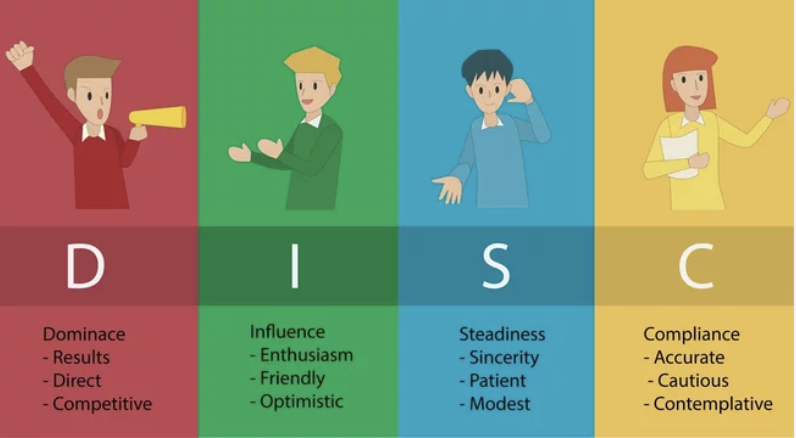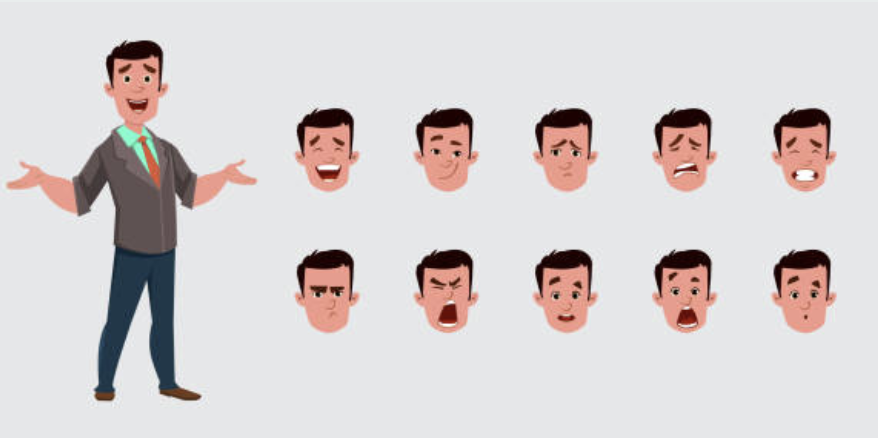Delving into the DISC Theory
By: Sanjana Dash
Education & Learning, Feature Articles, Health & Welfare, Psychology, Social & Youth development,

Do you prefer to order others around, or do you like to be a part of a team? Would you rather have a strictly professional attitude or be more approachable? You are what you show. However, how far is this true? Let’s find out here. DISC stands for the four behaviour styles that make up the DISC Model. Dominance (D), Influence (I), Stability (S) and Compliance (C) are its four dimensions.
What is the DISC Model?
DISC is a model for personal development that helps people make better decisions, communicate better, and build stronger relationships. Physiological psychologist William Moulton Marston first proposed it in 1928.
It has four sections:
1) Dominance (D)– Motivated, direct, goal-directed and competitive. People with dominance prefer to lead rather than follow.
2) Influence (I)– Enthusiastic, optimistic and energetic. They use their high energy levels to involve and motivate the whole team.
3) Steadiness(S)– Calm, easy-going and cooperative. They are the anchors of the group, capable of providing stability and reassurance.
4) Compliance (C)– Conscientious, methodical and perfectionist. They are more reserved, analytical and quality-oriented.
1) Dominance (D)
People with high dominance are extroverted, outgoing and task-oriented. Leaders typically possess such traits.
Strengths of the dominant personality type:
1) Direct
2) Decisive
3) Driven
4) Competitive
5) Demanding
Limitations:
1) Tendency to control and dominate
2) General impatience
3) Low tolerance for others’ feelings and ideas
4) Short-tempered
Furthermore, the D-style personalities are direct when expressing their opinions and authoritative in their approach.

Image credit –https://bit.ly/3OXR77Z
2) Influence (I)
People with a high influence style are enthusiastic, optimistic and energetic. Furthermore, they like to be the centre of attention.
Strengths of the Influence personality type:
1) Enthusiastic
2) Plentiful Ideas
3) Friendly and encouraging
4) A persuasive and compelling attitude
Limitations:
1) An over-emotional approach
2) A vibe of impatience
3) Less effective when working alone
4) Impulsive by nature
3) Steadiness (S)
The S-style personalities are calm, easy-going and cooperative. They are the group’s anchors, capable of providing stability and reassurance.
Strengths:
1) A methodological plan-based work style
2) A willingness to be a team player
3) A solid ability to stick to a routine
4) A friendly and supportive nature
Limitations:
1) A reluctance to voice emotions or criticism
2) A tendency to be overly accomodating
3) An aversion to confrontation
4) Tends to avoid change

4) Compliance (C)
The C-style personalities are conscientious, systematic and often perfectionists. They are more reserved, analytical and quality-oriented members of the team.
Strengths:
1) An eye for detail
2) A desire for accuracy and quality
3) An aptitude for problem-solving
4) Strong analytical and logical skills
Limitations:
1) A tendency to be overly critical
2) A habit of over-analysing things
3) A tendency to be accurate
4) Difficulty in decision-making
How do DISC & Emotional Intelligence Connect?
People with high levels of emotional intelligence are assumed to have a better ability to control their behaviour.
Our emotional intelligence (EQ/EIQ) helps us identify our emotions to understand better how they influence our actions. The limbic and frontal lobes of our brains control our decisions.
Our frontal lobe helps us solve problems, make decisions and control our impulses. In contrast, our limbic system creates a response that makes us act on instinct.
Sometimes, acting on instinct may produce favourable results. For example, you might instinctively save someone’s life without recognising the risks involved.
Therefore, emotional intelligence plays a crucial role in communication. Individuals with higher levels of Emotional intelligence respond to feedback rather than react to it. They listen rather than interrupt and avoid becoming defensive when faced with feedback.

Image credit- https://bit.ly/39pOco2
Motivators
Motivation helps influence behaviour and action. Identifying our natural motivators helps us pursue the right opportunities for the right reasons and achieve desired results.
DISC describes your behaviour, which provides insight into your communication preferences and how you are likely to interact with others.
Motivators are a reflection of your values and beliefs. Our motivators must be satisfied with our actions for alignment and superior performance. Discovering your motivations allows you to find your preferences and why you behave the way you do.
Wants and Needs
Motivation is the enthusiasm or willingness to do something. It is a universal characteristic. The motivation to succeed comes from within and not from someone else.
Our needs also drive our behaviours, and each style has different needs. If you are stressed, you may need some time alone; or social time around many people. We each have another way of meeting our needs. The more fully our needs are met, the easier it is to perform at an optimal level.

Image credit- https://bit.ly/3KQNLQB
How do you approach each personality type?
Dominance (D)-Style:
- It would be best if you were prepared and candid in expressing your opinions.
- Get right to the point.
- Identify and clarify your goals and objectives.
- Focus on results instead of methods.
- Focus on the end goal, resolving issues with a focus on the good of the team, not on a win for an individual.
Influence (I)-Style:
- Discuss personal details.
- Talk in terms of people and stories.
- Include lots of examples; ensure safety to receive honest feedback.
- Stay focused and work together to get results quickly.
Steadiness (S)-Style:
- Try not to be too aggressive.
- Earn their trust before making big decisions.
- Explain guidelines as clearly as possible.
- Assure safety by receiving honest feedback.
Compliance/Conscientiousness (C)-Style:
- Prepare yourself well with relevant facts and figures.
- Allow time for analysis.
- Avoid being too emotional.
- Respect their value of logic and objective reasoning.

Image credit- https://bit.ly/38WfmCS
Why are DISC Assessments conducted?
Unlike a personality test, the DISC profile assesses your communication style. These assessments are conducted to identify personalities within an organisation. However, it is not a reflection of who you are. A group of people can share some characteristics and be entirely different from one another.
These tools allow you to:
1) Increase your self-awareness and understand how you communicate;
2) Deal with conflict in a healthy way
3) Understand what motivates you
4) Understand what stresses you out
5) How you approach problem-solving
6) Discover how you make decisions
Conclusion
The DISC measures behaviour and emotion, whereas motivators represent the values that drive them. The alignment of our DISC and motivators leads to synergy. In contrast, if they are not aligned, we experience conflict.
Motivation is a vital part of emotional intelligence (EI/EQ). Being self-motivated can lead to increased commitment and optimism in achieving your goals. It is crucial to understand what motivates you to develop emotional intelligence because it will help you identify and understand yourself better.
You are different to many others and yet are similar in some aspects. We think and act differently from one another. However, our likes and dislikes might match, and so might our styles. These variations and similarities make up our personalities, which further shape how we communicate.
References- https://bit.ly/3vny9Qg, https://bit.ly/3vTVgSZ
Tags: DISC Theory, Mental Health, Personality Development, Psychology, Youth Development, youth mental health,










I have read your article carefully and I agree with you very much. So, do you allow me to do this? I want to share your article link to my website: gate io
Hi, sure, that would be okay with me. Thank you so much.